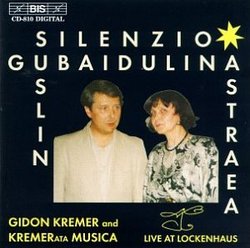| All Artists: Viktor Suslin, Sofia Gubaidulina, Elisabeth Chojnacka, Vadim Sakharov Title: Lockenhaus Festival 1995 Members Wishing: 0 Total Copies: 0 Label: Bis Original Release Date: 1/1/2006 Re-Release Date: 7/9/1996 Album Type: Import Genres: New Age, Classical Styles: Meditation, Opera & Classical Vocal, Chamber Music, Instruments, Strings Number of Discs: 1 SwapaCD Credits: 1 UPC: 789368400027 |
Search - Viktor Suslin, Sofia Gubaidulina, Elisabeth Chojnacka :: Lockenhaus Festival 1995
 | Viktor Suslin, Sofia Gubaidulina, Elisabeth Chojnacka Lockenhaus Festival 1995 Genres: New Age, Classical
|
Larger Image |
CD Details |
CD ReviewsGenerally minor material, with some strong moments, and best Christopher Culver | 01/23/2007 (3 out of 5 stars) "This BIS disc contains several performances recorded at the 1995 Lockenhaus Festival where the spotlight was on Sofia Gubaidulina (there are also two Viktor Suslin pieces, but I shall pass over those). Lockenhaus was the creation of violinist Gidon Kremer, who brought Gubaidulina to worldwide attention when he toured with her concerto "Offertorium", and besides performing on violin himself here, he has also gathered a number of world-class musicians. Of note are Friedrich Lips on bayan, the first performer on that instrument to inspire the composer, and the outstanding harpsichordist Elisabeth Chojnacka.
"Silenzio" (1991) is a set of five pieces for bayan, violin, and cello. As one can imagine from the title, this is a piece of very restrained writing. For Gubaidulina, silence is evocative of God and the religious experience, and is found often in her work (see its greatest exposition in the "conductor's solo" of her symphony "Stimmen ...Verstummen", the second string quartet is an example as well). The most active piece is the fourth, where pizzicato playing on the strings manages to overwhelm the accordion, which plays short tremolo bursts under the surface. Some of the sonorities here are very exotic and exciting, though this is one of Gubaidulina's least popularly accessible works. "Meditation on the Bach Chorale 'Vor deinen Thron tret ich hiermit'" for harpsichord and string quartet (1993) is a tribute to the composer who, along with Webern, Gubaidulina venerates above all. The music consists of four sections which each work toward presenting a piece of Bach's chorale, with the full chorale finally heard in its entirety at the end. The piece, like much of later Gubaidulina, makes use of special rhythmic forms based on the Fibonacci sequence and its variants, and even if the listener can't consciously do the math, the profundity and elegance of the structure is immediately likeable. This piece hasn't been performed very much, and besides this recording I only know of one from by the Deutsche Kammerphilharmonie on Berlin Classics, but I like it very much. "Dancer on a Tightrope (Der Seiltaenzer)" for violin and piano was written in 1993. Kremer performs on violin, while Vadim Sakharov accompanies him well on piano. Here the violin represents a tightrope walker attempting to keep his balance, while the piano, first played on the strings with a glass tumbler, is a symbol of risk. It's an interesting experiment, though not as successful as most of Gubaidulina's work. Ditto for "Ein Engel..." for alto and double-bass (1994), a brief setting of a poem by Else Lasker-Schüler. Neither the poem nor the scoring are particularly engaging. There's also an eleven-minute free improvisation by Astraea, the ensemble Gubaidulina founded with Suslin in the 1970s for experiments with traditional Central Asia instruments. This improvisation ranges from extrovert rhythms to sparse textures reminiscent of Takemitsu's pieces for Japanese instruments, to the sort of bubbling pizzicato often found in Gubaidulina's compositions. A different side of the composer that I wish were more visible. The liner notes are quite fine, giving information on the piece--even details of the obscure numerical mysticism in "Meditation", the text of the vocal works, and biographies of the performers. While Gubaidulina collectors will want to pick this disc up, especially for the Astraea improvisation (the easiest Astrea material to find), this is somewhat minor Gubaidulina. Neophytes are encouraged to check out her symphony "Stimmen... Verstumen..." (Chandos) or "Offertorium" (in DG's "20/21" series)." |

 Track Listings (13) - Disc #1
Track Listings (13) - Disc #1